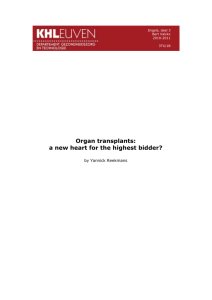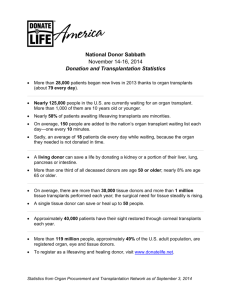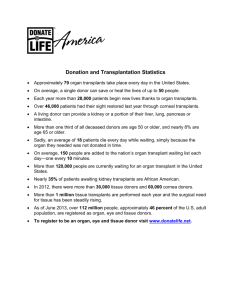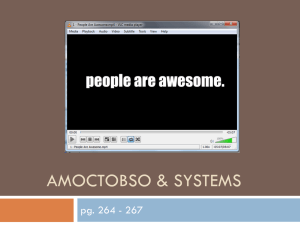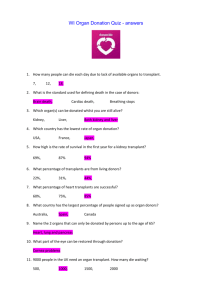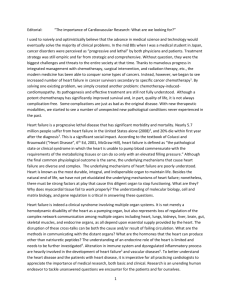Organ Donation - Mike Anderson`s Site
advertisement
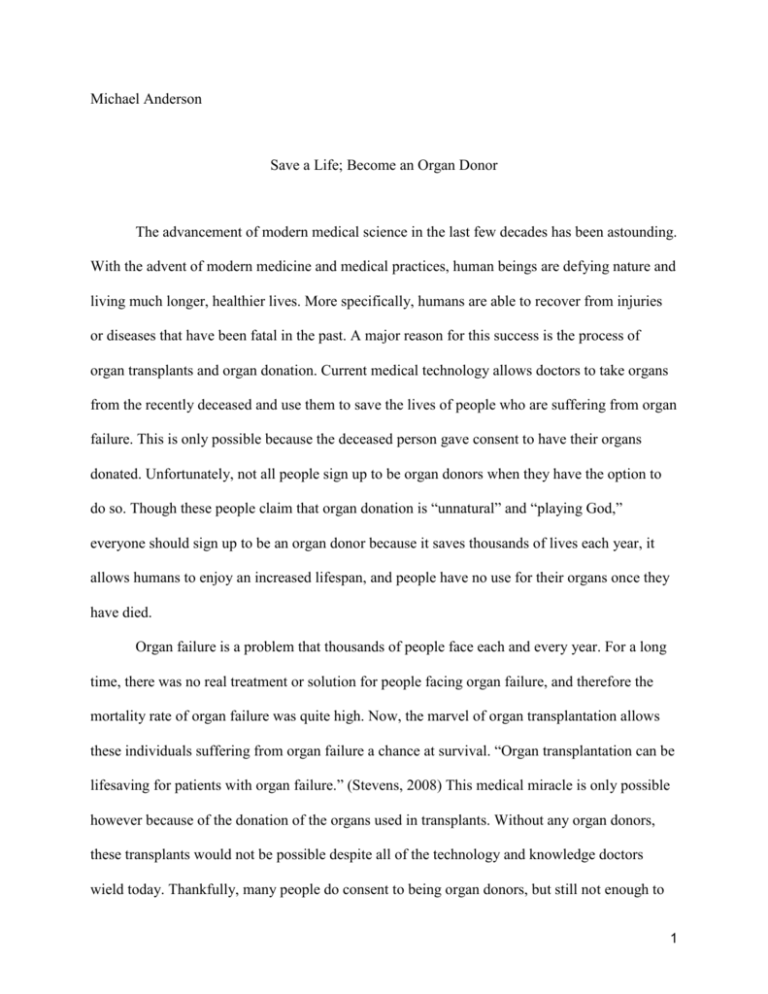
Michael Anderson Save a Life; Become an Organ Donor The advancement of modern medical science in the last few decades has been astounding. With the advent of modern medicine and medical practices, human beings are defying nature and living much longer, healthier lives. More specifically, humans are able to recover from injuries or diseases that have been fatal in the past. A major reason for this success is the process of organ transplants and organ donation. Current medical technology allows doctors to take organs from the recently deceased and use them to save the lives of people who are suffering from organ failure. This is only possible because the deceased person gave consent to have their organs donated. Unfortunately, not all people sign up to be organ donors when they have the option to do so. Though these people claim that organ donation is “unnatural” and “playing God,” everyone should sign up to be an organ donor because it saves thousands of lives each year, it allows humans to enjoy an increased lifespan, and people have no use for their organs once they have died. Organ failure is a problem that thousands of people face each and every year. For a long time, there was no real treatment or solution for people facing organ failure, and therefore the mortality rate of organ failure was quite high. Now, the marvel of organ transplantation allows these individuals suffering from organ failure a chance at survival. “Organ transplantation can be lifesaving for patients with organ failure.” (Stevens, 2008) This medical miracle is only possible however because of the donation of the organs used in transplants. Without any organ donors, these transplants would not be possible despite all of the technology and knowledge doctors wield today. Thankfully, many people do consent to being organ donors, but still not enough to 1 meet the demand. There is still a discrepancy in the number of solid organs that are available for transplant. (Gilligan, 2012) “Thousands of… patients may die because there are not enough donated organs to meet the demand.” (Stevens, 2008). It is imperative that more people sign up to become organ donors in order to help the thousands of individuals suffering from organ failure. Not only are lives saved by organ donation, but they are also improved. The wide array of organs that can be donated is astounding. Kidneys, livers, hearts, lungs, corneas, intestines, and pancreases are the most common organ transplants (Stevens, 2008), but there are still more organs that can be transplanted as medical technology improves. A majority of these are vital for humans to survive, but some of these organs merely improve the quality of life for transplant patients. Organs like corneas, cochleas, and bones are not necessary to save a person’s life, but they do make a person’s quality of life much better. These types of transplants can return a person’s ability to see, hear, or move. These transplants also don’t need to occur in the disabled; the elderly can receive such donations, and as a result many people enjoy a longer lifespan. With more people becoming organ donors, the idea of living a better, longer life becomes available to all. Despite all of these positive results of organ donation, many people still do not sign up to be donors. This is ridiculous, because when a person dies, they have no need of their organs. This means that for every non-donor who dies, they waste a complete set of organs that could have been used to help several other people who are still alive. One could even go so far as to say that people who don’t consent to donate their organs after their death are selfish. It all comes down to a question of ethics; which is more important, bodily integrity or human solidarity? 2 G. R. Dunstan describes the concept of bodily integrity like this: “Our bodies are unique, individual instruments by which we live, in reflection, expression, action, reception, relation. Bodily integrity, therefore, must be protected: we count it a wrong to kill, to harm, to abuse, to mutilate the human body; even to denigrate or disvalue it. That wrong can also be, in terms of law a crime, in terms of religion a sin.” (1997) While some people find this explanation to make sense, it really does not outweigh the needs of those awaiting organ transplants. Regardless of a person’s religion, all people can agree that once a person dies his or her body is useless. This being the case, how can such a religious argument be built? In conclusion, there are thousands of people every year who could benefit greatly from receiving an organ transplant. It is not possible to help these people unless there is an increase in the number of available organs, and therefore an increase in organ donors. With more donors thousands of lives could be saved each year, length and quality of life would increase for all people, and perfectly good organs would not be wasted upon death. Any question of morality pales in comparison in comparison to the universal good brought about by organ donation. Everyone benefits if more people consent to being organ donors. 3 Bibliography Dunstan, G. R. "The Ethics of Organ Donation." British medical bulletin 53.4 (1997): 921. Print. Gilligan, Conor, Robert William Sanson-Fisher, and Heidi Turon. "The Organ Donation Conundrum." Progress in transplantation (Aliso Viejo, Calif.) 22.3 (2012): 312. Print. Stevens, Lise M., Cassio Lynm, and Richard M. Glass. "Organ Donation." JAMA: The Journal of the American Medical Association 299.2 (2008): 244. Print. 4

